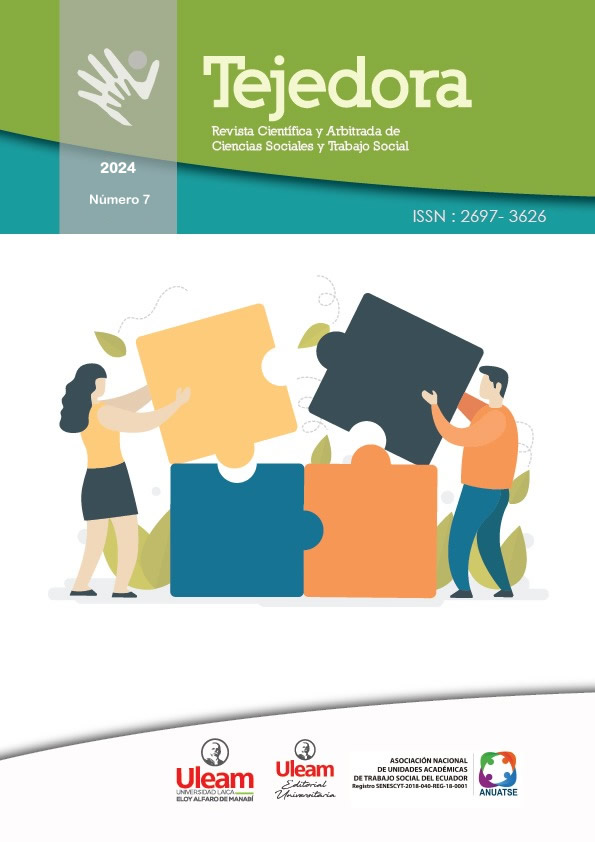WAYS OF LIFE IN TIMES OF COVID – 19 PANDEMIC
DOI:
https://doi.org/10.56124/tj.v7i16.019Keywords:
Covid-19, quality of life, LifestylesAbstract
As time goes by, human beings are affected by various factors that threaten their physical and psychological well-being, as is the case of the covid19 pandemic, which has had a great impact on the ways and lifestyles of individuals. Objectives: Analyze the factors that affect lifestyles and lifestyles and their importance in quality of life in times of the Covid-19 pandemic; identify the risk factors in the ways and styles of life and determine the ways and styles of life of the residents in times of pandemic. Methodology: A quantitative, bibliographic, documentary, field, cross- sectional and descriptive research is applied, with a sample of 100 individuals from the San Ramon citadel of the Marcabeli canton; An instrument called “Fantastic lifestyle questionnaire” is used. Conclusions: When analyzing the factors that affect the ways and styles of life and their importance in the quality of life in times of pandemic, it was observed that the lifestyle that individuals lead actually has an impact on the contagion of diseases that can reach cause serious discomfort to the human body.
Downloads
References
Arias, J. (2021). Percepcion De Los Internos Rotativos Acerca De Los
Cambios De Estilo De Vida Durante La Pandemia Covid-19”. Universidad Técnica De Ambato, 1-26. Obtenido de http://repositorio.uta.edu.ec/bitstream/123456789/32398/1/ATIAJA%20ARIAS%20JOSSELIN%20TERESA%20-M.pdf
Burbano, D. (2018). Estilos y calidad de vida en salud del paciente hipertenso.
Universidad Nacional de Colombia, 122. Obtenido de https://repositorio.unal.edu.co/bitstream/handle/unal/62063/dairavanesaburbanorivera.2017.pdf?sequence=1&isAllowed=y
Cavalho, et al., M. (2020). La pandemia de COVID-19 y los cambios en el estilo
de vida de los adultos brasileños: un estudio transversal, 2020. Epidemiol. serv. saúde. Obtenido de
https://search.bvsalud.org/global-literature-on-novel-coronavirus-2019 ncov/resource/pt/grc-741553
Cerón, X. (2018). Relación de calidad de vida y salud oral en la población
adolescente. Odontóloga Universidad Cooperativa de Colombia-Pasto, 1-9. Obtenido de file:///C:/Users/JOSE%20CABRERA/Downloads/Dialnet RelacionDeCalidadDeVidaYSaludOralEnLaPoblacionAdol-6583156.pdf
Díaz, et al., C. (2017). Factores sociales de estilos de vida de adolescentes de un
consultorio Médico de Familia de la Atención Primaria de Salud. Revista Habanera de Ciencias Médicas. Obtenido de http://scielo.sld.cu/scielo.php?pid=S1729 519X2017000300015&script=sci_arttext&tlng=en
Feria, et al., H. (2020). LA ENTREVISTA Y LA ENCUESTA: ¿MÉTODOS O
TÉCNICAS DE INDAGACIÓN EMPÍRICA? Didáctica y Educación, 18. Obtenido de http://revistas.ult.edu.cu/index.php/didascalia/article/view/992/997
Fernandez, C. (2020). El método etnográfico como construcción de
conocimiento: un análisis descriptivo sobre su uso y conceptualización en ciencias sociales. Revista de Educación de la Universidad de Málaga. Obtenido de https://riuma.uma.es/xmlui/handle/10630/19608
Ferrera, et al., J. (2018). ESTILOS DE VIDA Y SU INFLUENCIA
Gianzo, et al., M. (2020). Cambios en los habitos alimentario durante el periodo
de confinamiento por la pandemia covid-19 en España. Revista Española de Nutricion Comunitaria, 1-11. doi:DOI:10.14642/RENC.2020.26.2.5213
Guzman, E., Concha, Y., Lira , C., Vasquez, J., & Castillo, M. (2021). Impacto
de un contexto de pandemia sobre la calidad de vida de adultos jóvenes. Revista Cubana de Medicina Militar, 1-90. Obtenido de http://scielo.sld.cu/scielo.php?pid=S0138 65572021000200006&script=sci_arttext&tlng=pt
Lahera, F. (2017). El método explicativo como alternativa de aprendizaje
independiente en la escuela cubana del siglo XIX. Universidad de Holguín. Obtenido de https://luz.uho.edu.cu/index.php/luz/article/view/824
Perez, et al., E. (2020). MONITOREO DE EMOCIONES BÁSICAS
AUTOREPORTADAS RELACIONADAS CON EL CONFINAMIENTO POR COVID-19 Y EL REGRESO A LA VIDA COTIDIANA. Veritas Et Scientia, 8. Obtenido de http://revistas.upt.edu.pe/ojs/index.php/vestsc/article/view/397/336
Pierre&Harris, R. (2020). COVID-19 en América Latina: Retos y
oportunidades. Revista chilena de pediatría. doi:http://dx.doi.org/10.32641/rchped.vi91i2.2157
Rafael, M. (2018). Estilos De Vida Y Factores
Biosocioculturales De Los Adultos De La Comunidad Unidos Venceremos – Huashao Yungay, 2018. Universidad Católica Los Ángeles Chimbote, 123.Obtenido de http://repositorio.uladech.edu.pe/bitstream/handle/123456789/7789/ADULTOS_ESTILOS_DE_VIDA_RAFAEL_LEON_MARY_ELENA.pdf?sequence=1&isAllowed
Villar, M., Ballinas, Y., Gutierrez, C., & Angulo, Y. (2017). Análisis De La
Confiabilidad Del Test Fantástico Para Medir Estilos De Vida Saludables En Trabajadores Evaluados Por El Programa “Reforma De Vida” Delseguro Social De Salud (Essalud). Revista Peruana De Medicina Integrativa, 1-10. Obtenido de https://repositorio.essalud.gob.pe/bitstream/handle/20.500.12959/3983/An%c3%a1lisics%20de%20la%20confiabilidad%20del%20test%20Fant%c3%a1stico%20para%20mec=1&isAllowed=y
Zuñiga, A., Coronel, M., Cesar, N., & Vaca, R. (2021). Correlación entre
calidad de sueño y calidad de vida en estudiantes de Medicina. Revista Ecuatoriana de Neurología, 1-70. Obtenido de http://scielo.senescyt.gob.ec/scielo.php?pid=S263125812021000100077&script=sci_arttext
Published
How to Cite
Issue
Section
License
Copyright (c) 2024 Revista Científica y Arbitrada de Ciencias Sociales y Trabajo Social: Tejedora. ISSN: 2697-3626

This work is licensed under a Creative Commons Attribution-NonCommercial-ShareAlike 4.0 International License.






















